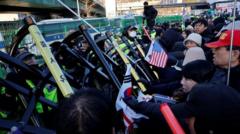The recent arrest of South Korea's suspended President Yoon Suk Yeol has sent shockwaves through a nation already grappling with substantial political division and uncertainty. The dramatic scenes outside Yoon's residence in Yongsan, Seoul, saw supporters clashing with police forces as they attempted to take the president into custody. Many citizens expressed deep sorrow and frustrations about the current political climate, with one pro-Yoon protester lamenting, "This country is in crisis," highlighting the emotional stakes involved.
In the wake of an attempted arrest on January 3 that failed due to a dramatic standoff, the final capture of Yoon on a recent Wednesday morning served as both a culmination of tension and a point of reflection for a divided populace. The scenes of unrest outside his home showcased the breadth of emotions present; on one side stood fervent supporters of Yoon, while on the other, jubilant opponents celebrated their victory. This polarization illuminates the broader schism within a society now accustomed to discord over governance and democratic principles.
After declaring martial law on December 3, Yoon's leadership faced increasing scrutiny, leading to an impeachment by parliament. Many citizens view these actions as an overreach of power, while a segment of the population continues to back the president's claims of national threats. Consequently, Yoon's own political party is fraught with internal divisions as lawmakers confronted calls for impeachment—a sentiment that complicates the narrative within South Korean politics.
Even amidst the season typically bustling with celebrations, the atmosphere across the country remained heavy. Alongside political unrest, a tragic air crash on December 29 further added to the overall sentiment of unease. Yoon's public presence diminished following his impeachment, leading him to communicate initially through social media rather than direct engagement with supporters. As his trial approaches, many eagerly anticipate his statements and public behavior from detention.
The arrest signals not just the immediate cessation of tensions at the presidential compound but an ongoing debate surrounding the legality of such actions. Though Yoon contends that the Corruption Investigation Office's (CIO) attempts to detain him were invalid, the agency argues that charges of insurrection fall within the realm of their investigations, complicating legal interpretations in the ongoing political discourse.
This tumultuous period in South Korea represents not merely a political juncture, but a pivotal moment for the fabric of its democracy, giving rise to fears that polarization will continue to dominate the landscape regardless of Yoon’s fate. Observers note the implications of utilizing impeachment as a political maneuver, cautioning that the precedent could influence future governance and citizen trust. The coming weeks and the dynamics of Yoon's arrest and trial are poised to shape South Korea's political landscape for years to come.



















